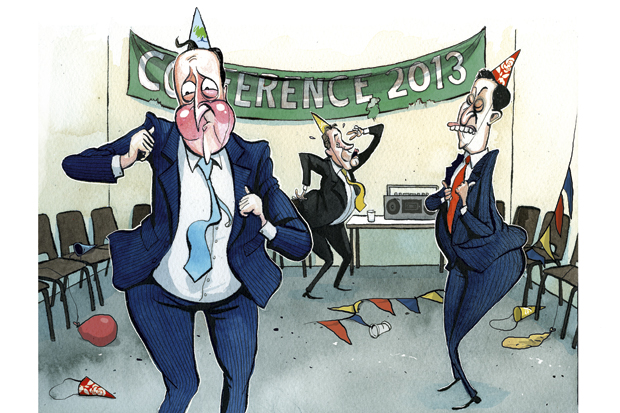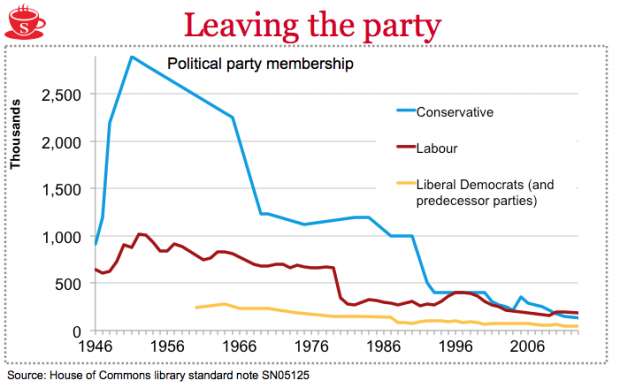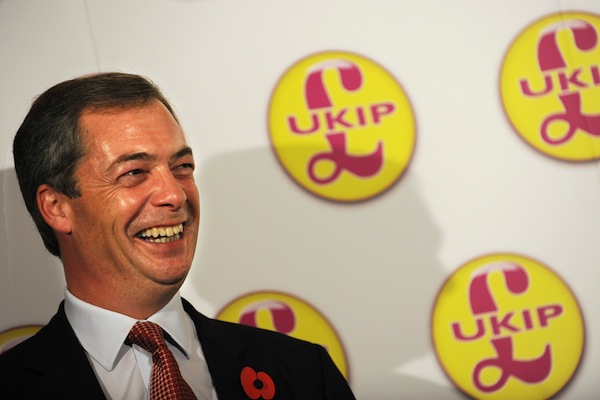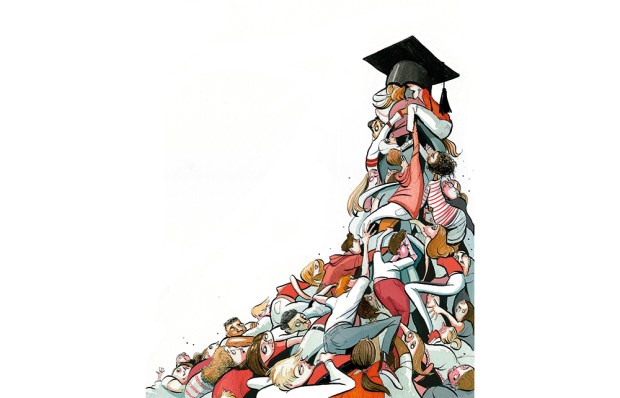If Cyril Northcote Parkinson was still around he would devise a law for party political conferences: that the significance of what is discussed in the conference centre is inversely proportional to the difficulty of getting in. Time was, when politicians stayed in shabby hotels in Blackpool and wandered along the seafront to the Winter Gardens to debate with constituency members, that conferences meant something. Over the next three weeks anyone visiting Glasgow, Manchester or Brighton, even if not involved in a party conference, will be inconvenienced by a security buffer which resembles the former green zone in Baghdad. But will anyone care what goes on inside?
Party conferences have become a misnomer. The last genuine conference was held about 20 years ago, since when the events have evolved into lobbyists’ trade shows. There will be no genuine conferring over policy. All that will happen is that ministers will make presentations of policies which have been conceived and honed by a small coterie of aides in London, and a very large number of lobbyists will compete for ministerial attention. The switch from seaside towns to large cities is indicative of the change: the latter have better restaurants, for the benefit of people on expense accounts.
Delegates will drown in saccharin as leaders pay tribute to the hard work of the envelope-stuffers who make the party tick. The BBC may even present the conferences as a meeting of the party faithful — but it will be a big lie. Neither Cameron, Miliband nor Clegg care one jot for their respective bands of swivel-eyed loons, whom party managers will do all they can to keep away from the podium — even if they are a little more subtle about it than the bull-necked bouncers who ejected 82-year-old Walter Wolfgang from Labour’s conference in 2005. The sheer cost of attending nowadays restricts it to those with a working interest in politics.
The good news for party managers is that there are fewer and fewer party members to keep under control. The posher the conference venues have become, the smaller the parties have become. In 1953 the Conservative party had 2.8 million members and the Labour party 1 million. It isn’t easy to find out current membership levels, owing to the refusal of parties to publish the data — itself surely a sign of the problem. But a House of Commons briefing paper last December came up with estimates of 193,000 for Labour and between 130,000 and 170,000 for the Conservatives.
The website ConservativeHome (which now stages its own conferences) last month surveyed Conservative constituency associations which do return membership figures. It ads up to just under 60,000 paid-up members. This suggests total membership is unlikely to exceed 100,000 — less than half of the 253,600 when Cameron was elected leader. Never mind trade unions, the Church of England, county cricket: the Conservative party has taken over the role of Britain’s most rapidly declining institution. With an average age of 68, the Conservative party is like a rural bus service whose clientele has dwindled year-on-year to an elderly rump, to the point at which it would be cheaper to replace it with a dial-a-ride taxi service.
Labour’s membership has been more stable but its situation is arguably worse. A huge slice of its affiliate membership is made of people drafted in, through union membership, without their approval or even their knowledge. The GMB union, for example, automatically affiliates 420,000 of its members to the Labour party at a cost of £3 a year each. The union, in slashing its annual donation to Labour from £1.2 million to £50,000, reckons only 50,000 of its members would voluntarily choose to join the Labour party. Ed Miliband’s party has become like one of those supermarket loyalty card schemes which force you to join something called a ‘club’ when all you want is tuppence off your groceries. Take away the involuntary members and there is really very little left.
Surely Cameron and Miliband have the insight to make the link between their shrinking parties and the disdain with which they treat their members. Every time that Cameron drafts in A-list candidates above their heads, or imposes a policy like gay marriage which is so obviously at odds with the views of the bulk of his membership, he yet further undermines any reason for joining his party: if you want to influence David Cameron you would be better off joining Stonewall than the Bognor branch of the Conservative party.
It is not impossible to increase membership of a political party in the modern age. Blair achieved it in the mid-1990s. Nigel Farage manages it today: at the current rate of convergence Ukip will have more members than the Conservative party within five years. If you have a mission that inspires people, they do sign up. But rather than trying to find such a mission, the big parties seem more occupied with how to reach the holy grail of state funding of political parties without too much in the way of public outrage. One senses that they privately love party funding scandals because each one brings them closer to the point at which, they hope, the public will see state funding as a lesser evil than funding by plutocrats.
My guess, though, is that the public won’t buy it, any more than they bought the idea of higher MP salaries to compensate for lower expense claims. There is, of course, another option to propping up political parties with public money: let them go to the wall.
A decade ago, I might have gone on to argue that they must listen to the grassroots, or return to having proper conferences which actually decide policy. But I can’t see the point any more. The public has quite clearly decided that the future of democracy lies elsewhere: in popular protest, social media campaigns, single issue groups and so on. The success of groups like TaxPayers’ Alliance or the left-wing campaign group 38 Degrees shows there is plenty of interest in political issues. Just not in political parties.
Political parties are dying because the population is becoming less and less tribal. Only this week, we found that the number of people who consider they have a strong affiliation with a political party has fallen to less than a third. This trend, found in the British Social Attitudes survey, has been decades in the making. Yet elections continue to be fought roughly in accordance with the social structure of 100 years ago, when it was a reasonable reflection of political opinion to have a party of property and a party of workers. Yet the last election which was a genuine fight between property and labour was 1951 — which happens to be the time when membership of political parties peaked.
Huge numbers joined the Tories between 1945 and 1951 because they had one over-riding objective: to keep their property and their savings safe from socialism. This worked. But Labour’s abolition of Clause 4 finally did away with any justification for a two party system. What great schism exists between voters now? The size of the state? Hardly, when the difference between Labour and Conservatives is a few percentage points at most. Fiscal policy, monetary policy, foreign policy? George Osborne is now borrowing more than even Gordon Brown proposed. There simply is no divide in opinion obvious enough and large enough to suggest why half the country should want to be on one side and the other half on the other.
But neither has Britain successfully moved to a multi-party system. Like the Greens in 1989 and Ukip in this year’s local elections, minor parties do from time to time enjoy a spectacular advance. But they invariably retreat again once when they attempt to formulate policy beyond their defining cause. Ukip is a case in point. Its founder, Alan Sked, left when he felt it was attracting members who were racist and anti-intellectual. He now wants to set up another anti-EU party, this time one which opposes the so-called ‘bedroom tax’ and seeks to renationalise the railways.
My guess is that Alan Sked will never be happy in any party for long, not even his own. But then most of us at heart are Skeds: we find ourselves with a range of opinions which straddle the manifestos of all the main parties, and many of the minor ones as well. Just because we, say, don’t think an air strike on Syria is a good idea doesn’t, of course, mean that we think free schools are a bad idea. Yet every election forces us to choose between baskets of policies. The political system offers us only fixed menus when most of us really want to go à la carte.
In these pages last week Peter Lilley and Matthew Parris, both of whom have spent much of their working lives under the thumbs of party machinery, hailed the rebirth of parliamentary democracy evidenced by the Syria vote. No issue better demonstrates the anachronism of political parties, in that doves and hawks are divided across the political spectrum. But give the whips half a chance and they will be back. They will regroup and, as the election approaches, the brave will wilt once more under the threat of being banned from standing under the party banner. That will always be the case, so long as there are parties and there are whips.
But what if convention were to be abandoned and the Prime Minister and the main offices of state could be directly elected? The possibility that any MP could become Prime Minister would encourage independent candidates to come forward, who could stand on their own genuine beliefs, not those fed to them by party managers (or donors). No longer would an incoming government have a mandate to enact a single manifesto, with whips on hand to bully MPs into line; every policy would have to command support of the House of Commons on its own merits. Then the country could simultaneously vote — as it would choose to do — for both welfare reform and a mansion tax.
Yes, it would be messy in a sense, because you would end up with a PM being forced to work with people he had not chosen to work with. But then that would far more resemble life outside Parliament. What business is run along tribal lines, with two slates of executives constantly trying to do each other down?
The public has made it quite clear that it sees the idea of political parties as dead. The trouble is, how do we kill them off when the future of the constitution lies with the parties themselves? That is the problem. We are destined to trundle on for many more decades being governed by two and a half parties which have ever fewer members, and no doubt end up being propped up with taxpayers’ money — until, maybe, some distant time in the future when sufficient MPs are offended by their leader and their whips that they stage a mass resignation from their party. I can only hope that I will be around to see it.
Got something to add? Join the discussion and comment below.
Get 10 issues for just $10
Subscribe to The Spectator Australia today for the next 10 magazine issues, plus full online access, for just $10.
You might disagree with half of it, but you’ll enjoy reading all of it. Try your first month for free, then just $2 a week for the remainder of your first year.

















Comments
Don't miss out
Join the conversation with other Spectator Australia readers. Subscribe to leave a comment.
SUBSCRIBEAlready a subscriber? Log in